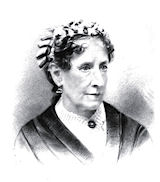Norwich, Sept 16th, 1862.
My own dear Son:
I have very little reason to believe in the probability of your receiving my many letters, yet I continue to write with the bare possibility that they may some of them reach you. Last night came the news of a glorious victory for us, but alas! also came the sad and sickening news that another of our good and able Generals was killed. In the general rejoicing my heart is heavy, for my dear son was in Reno’s command when I last heard, and I am looking with fear and dread for the terrible list to come from that battlefield. How my God is trying me, and how merciful he has been to preserve my precious son through so many appalling dangers! My heart was so full of sympathy for Mrs. Stevens. I wrote her a letter a few days ago. I saw that her husband was buried at Newport, and an extract from an address delivered on the occasion impressed me wonderfully. We are all occupied by the same train of thought, deepened in intensity of course with some of us by the danger our loved ones are in. I received a very kind letter from Horace a few days since, wherein he dwells upon the birth of your reputation; he says at twenty-four you have won honors enough to suffice for a life time. You are not forgotten, my own son, my heroic boy. Many hearts are watching, eager for every word from you. The extract from your letter in the N. T. Post has attracted the attention of many who know you personally, or have heard of you. They say the account is interesting, and written, too, by one who observes. . . .
17th. To-day our rejoicing is somewhat subdued by the news of the surrender of our forces at Harper’s Ferry. Burnside’s corps is said to have fought splendidly at South Mountain; Reno’s Command is highly complimented, not a man faltered. I am so longing for another letter from you. I see the 79th was in the recent engagements. It seems they are always where work is to be done. I saw, too, that Capt. Pier, of whom I have heard Dr. Elliott speak, was slightly wounded. I trust you have escaped unhurt, that God’s good angels have guarded you, and brought you safely through. I noticed the names of one or two from Co. K, 79th, among the wounded. Uncle John’s faith in Gen. Pope remains firm. Mine is lost, yet I wish all to receive full justice, and am very glad to discover merit among our officers; our men are almost beyond praise.
Miss Abby Bond (Dr. Bond’s daughter) is to be married to-day, to a Mr. Adriance from St. Louis. Nannie Day has come up to attend the wedding. Hunt is in good spirits this morning; he sends love, thinks you are doing great things, and hopes the ball, now in motion, will move until the great end for which it was started is accomplished. He says he sees McClellan has been under a chiropodist, and he is glad to see so glorious a result.
Again, good-bye, my own dear son. I pray that you, so marvellously preserved as a soldier of our country, may likewise always remain a soldier of the Cross. God bless you, guard you, guide you, wherever you may be.
With much love from all, I remain, my precious son,
Always your loving
Mother.



